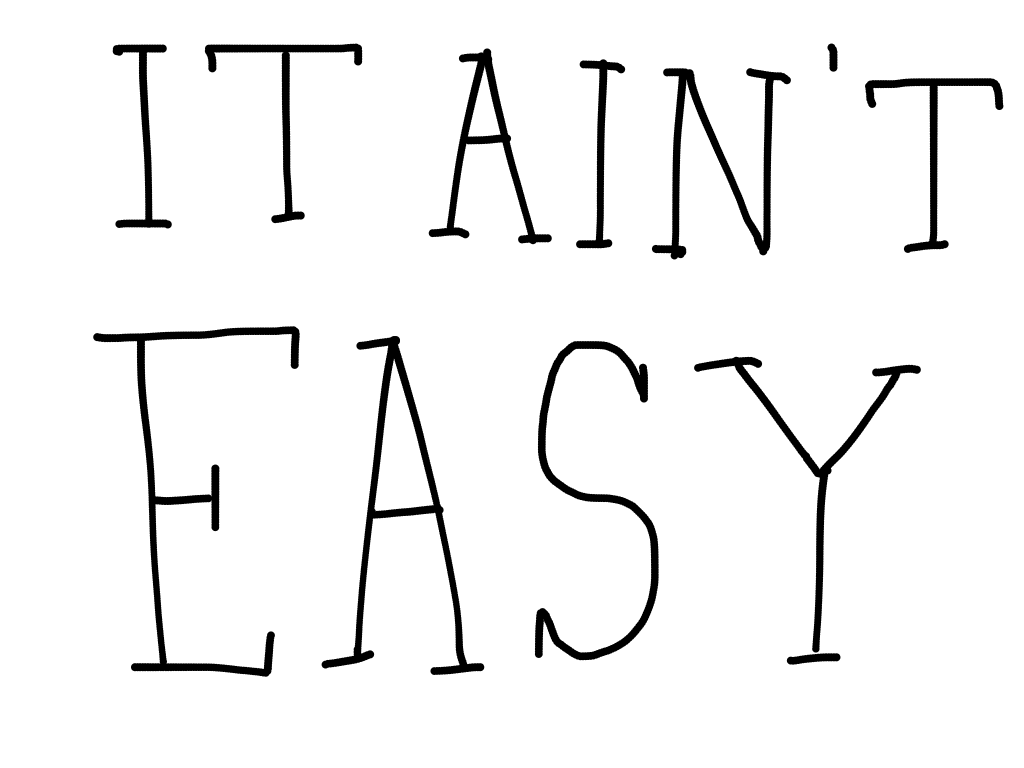


You can measure the health of relationships, teams, and organizations by measuring the lag time between when problems are identified and when they are resolved. The only reliable path to resolving problems is to find the shortest path to effective conversation.
Crucial Conversations: Tools for Talking When Stakes are High
…The longer the lag time during which you act out your feelings rather than talk them out, the more damage you’ll do to both relationships and results.
This post continues reflections on Heather Holleman’s The Six Conversations, I will return to Death & Dying later, frankly I need a break.
In writing this series and attempting to have meaningful conversations, I have discovered meaningful conversations are not easy. It is no surprise death and dying conversations are difficult, but generally it ain’t easy to have meaningful conversations.
Based on experience, I contend that there is an inverse proportional relationship between meaningful conversations and the caliber of relationship. i.e. the closer the relationship the more difficult, or less likely, it is for meaningful conversations to occur. There are exceptions, but the key point is “meaningful”. Close relationships are typically filled with fun, entertaining and informative conversations but when meaningful and/or serious topics arise— not so much. Either the conversation shuts down or it is diverted to a less risky topic.
If you fail to discuss issues you have with your boss, your life partner, your neighbor, or your peer, will those issues magically disappear? No. Instead, they will become the lens you see the other person through. And how you see always shows up in how you act. Your resentment will show up in how you treat the other person.
Crucial Conversations
That is a reality that should prompt serious assessment of the health of the relationship or, at a minimum, an examination of how qualified I am to have meaningful conversations. Hopefully these posts help us become better qualified.
Barriers to meaningful conversations
FEAR AND SELF-CONSCIOUSNESS
IN chapter 7 Holleman observes: “most people fear more than anything else in the world. Shame. They fear exposure. They fear looking stupid. They become incredibly self-conscious that people are evaluating them.”
I believe that to be true, and with those closest to us, the fear of shame rises exponentially. Reasons why meaningful conversations are often more difficult are several. Holleman identifies shame and self-consciousness as a significant factor.. I found these citations worthwhile counsel for dealing with shame and self-consciousness:
The more weakness, failure, vulnerability, and shortcomings you display in conversation, the more close conversation partners become. Why? It’s because you can experience acceptance, unconditional love, and a common bond of shared weakness.
(p. 110).
“self-disclosure is the process of revealing personal information to another person, and it is a well-documented behavior that promotes liking and closeness within new relationships…the more you share embarrassing or vulnerable things about yourself, the more people will like you, trust you, and connect with you”
(p.110-111)
Other people need conversation. You offer a great gift to them when you enter into a conversation. Margaret Wheatley, an expert in community building, reminds us that “we can also take courage from the fact that many people are longing to be in conversation again. We are hungry for a chance to talk. People want to tell their story, and are willing to listen to yours. People want to talk about their concerns and struggles. Too many of us feel isolated, strange, or invisible. Conversation helps end that.”
(pg. 112-113).
Other barriers which come to mind are:
Secular society
Disenchantment
Meaningful conversations are rituals in which the presence of scared can be seen and felt and experienced. In a society in which belief in God is just one human possibility among others; they are are avoided and/or discountedbecoming casualties of a secular mindset which eschews the sacred and resists transcendence.
Individualism
In a society where concern for self is the highest priority, there is no foundation for meaningful conversations, which require empathy and concern for others .
Digital Communication
There is an increasing reliance on digital communication to “converse”with others. Useful and sometimes helpful, digital communication cannot replace human face to face interaction required for meaningful conversation.
Noise/Distractions
The difficulty of having meaningful conversations amid the noise and distractions of every day circumstances should not be underestimated. Engagement with others is subordinated by smartphones constantly notify us of texts, email, Tik Tock, Facebook, Twitter notifications. The secular mindset even often makes children and pets distractions.
Proximity
Without question, face to face is the context most conducive to meaningful conversations. The way communities and families are structured and function often inhibit proximity.
Other barriers could be mentioned, and those above deserve more explanation; but I think that is enough to support a contention that meaningful conversations ain’t easy.
I am increasingly convinced the absence of meaningful and loving conversations is a major factor contributing to discord and division in our society including families and churches.
Closing thoughts
- Meaningful conversations are rare and precious. Due to their transcendent nature, they are received, not manufactured; like a fragrant rose, we must attend to their presence or miss full experience. Pay attention to relationships and such rare occasions, stop and smell the roses.
- For conversations to be meaningful and loving , participants will value and exhibit concern for others, empathy, humility —overtly Christian qualities.
“Do nothing from selfish ambition or conceit, but in humility count others more significant than yourselves. Let each of you look not only to his own interests, but also to the interests of others”. Philippians 2:3–4;
which explains, in part, my assertion that meaningful loving conversations are a spiritual discipline.
Meaningful, loving conversations are not exclusive to Christians but the reality of a famine of meaningful conversations among Christians, and between Christians and others, is cause for deep concern and self-examination.
STILL ON THE JOURNEY